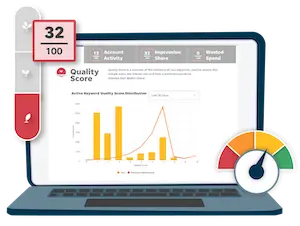Keyword Ranking: How to Get Better Rankings for Top Keywords
Keyword ranking—where your site is ranked in search engines for a keyword—has a major impact on your Web traffic, lead generation, and conversions. Research shows that more than half of all search engine users click on a result on the first page, and the higher you rank on that SERP, the better off you are.
Most site owners have questions about how to improve keyword rankings, such as “How does my site rank for the keywords I’m targeting?” and “What keywords does my site rank for?”
Simple, free keyword ranking tools can answer those questions for you. And this keyword ranking data is good to know. But what you really want is to rank higher on Google, beat competitor sites and drive more traffic!
For both organic SERP rankings and paid rankings using AdWords, a higher keyword rank can be achieved using keyword research tools, improving your keyword rankings by giving you more power over your keywords and and what you do with them.
Track rankings for the right keywords
If you’re going to bother tracking your keyword rankings in search engines, such as Google, Bing or Yahoo, make sure you’re focusing on the right keywords for your website. It’s also important to know the ranking factors with respect to keywords.Too often, people short-change keyword research (assuming they know what keywords their audience is using) or rely too heavily on free, third-party keyword suggestion tools.
The problem with these third-party tools? They’re not personalized. They return the same general, popular keywords to everyone, so you have no competitive edge, and no way of knowing how truly relevant they are to your business.
The solution is to base your keyword list on real, private data. Using WordStream for keyword research, you’ll be able to leverage your own website data to form a keyword database that is:
- Private
- Personalized
- Extensive
- Accurate
- Relevant
When your keyword list is derived from the actual keywords that real people have used to find your site, you know they’re relevant to you. Plus, you’ll know which keywords are driving the most traffic and conversions. Public keyword tools can only provide vague estimates that are useless when it comes to real search marketing decision-making.
Focus on Long-Tail Keyword Rankings
Another benefit of WordStream’s keyword tools is the ability to leverage the long tail. Long-tail keywords are longer, less common keywords that offer a couple of advantages for search marketers:
- They’re less competitive: Fewer people are trying to rank for long-tail keyword phrases, so your site has a better chance of achieving high rankings.
- They’re more targeted: Longer keywords show more intent—they reveal more about what the searcher is looking for, so you can better serve them with a specific offering or specific Web content.
WordStream is a sophisticated, scalable keyword tool that allows you to store, group, organize, analyze and act on millions of keywords.
Group and organize keywords for higher rankings
WordStream’s most powerful feature is its suite of keyword grouping and organization tools. Effectively grouping your keywords makes a huge difference when it comes to improving your individual keyword rankings. This is because tightly related keyword groups enable more strategic search marketing initiatives.
Well implemented and organized keyword groups contribute to:
- More targeted PPC ads: More targeted ads have higher click-through rates, which improves your Quality Score and leads to better rankings for your keyword advertising campaign.
- More targeted landing pages: Landing page copy that closely matches both your ad and the keyword improves Quality Score, and optimized landing pages also increase conversion rates.
- Stronger information architecture: Let your keyword group structure inform your website organization. You can also use keyword analytic data to prioritize your workflow—create ad groups and Web content around the keywords driving the most traffic first.
Creating keyword groups in WordStream is highly efficient, because the software automatically suggests groupings based on relevance.
Real, accurate keyword data and better organization bring far more value to your search marketing efforts than basic keyword ranking software. WordStream gives you the tools to actually improve your rankings for the keywords that matter most to your business. So when potential customers are searching for your related keywords, your site will get found, ahead of your competitors.

